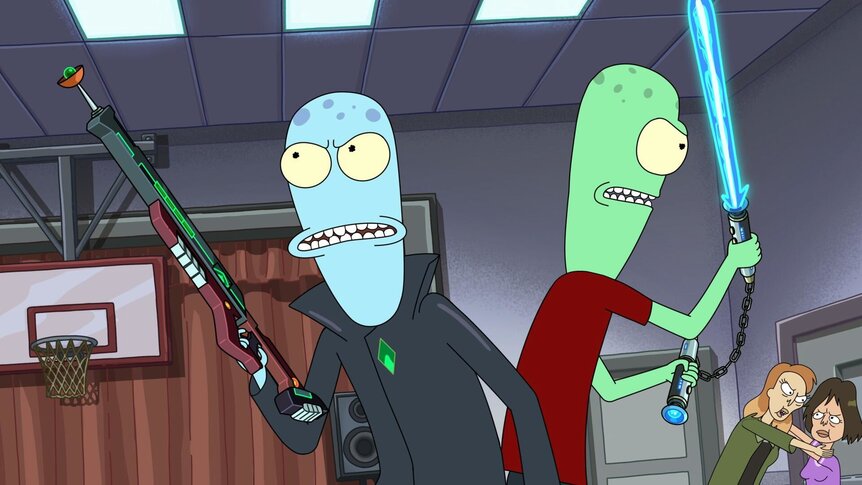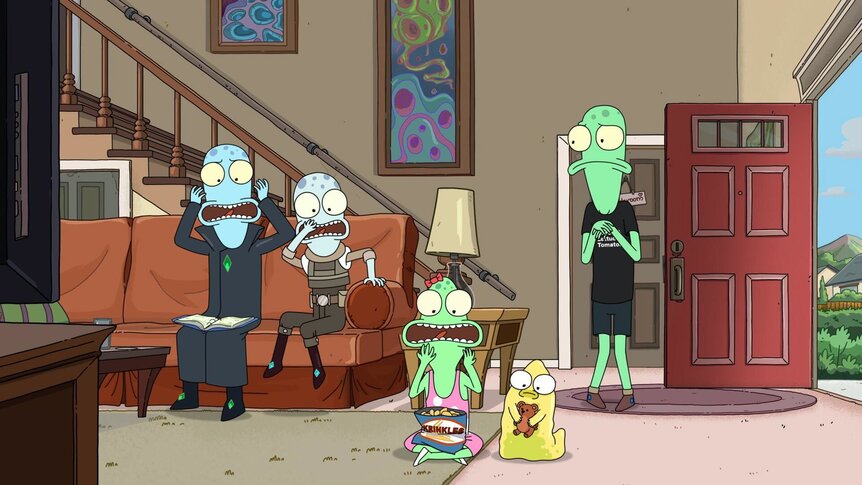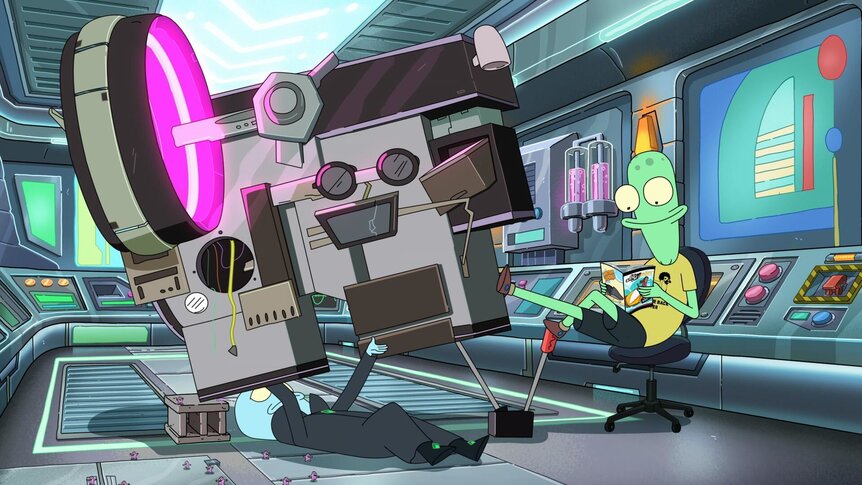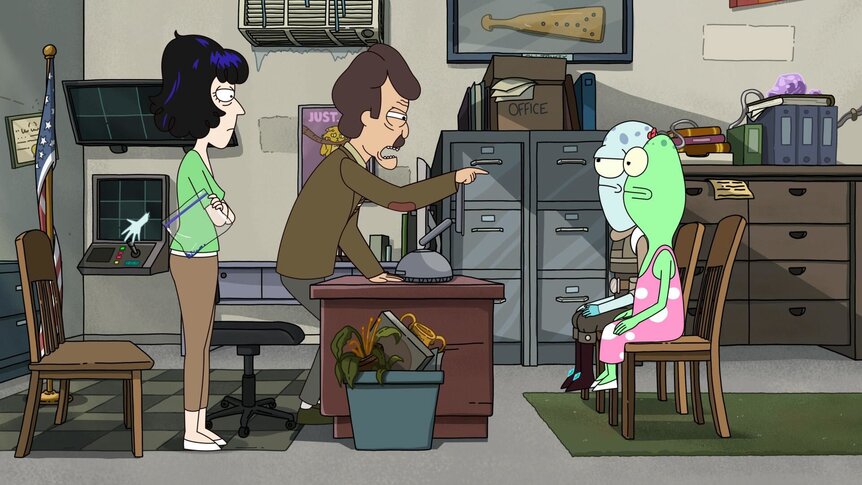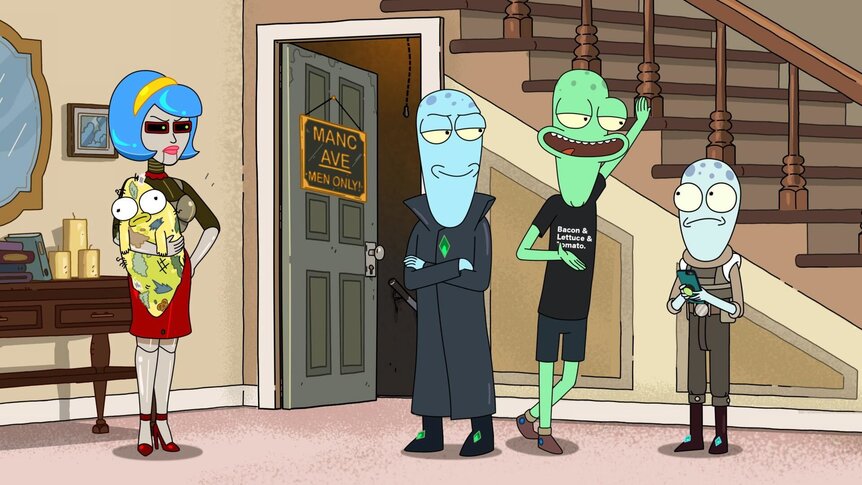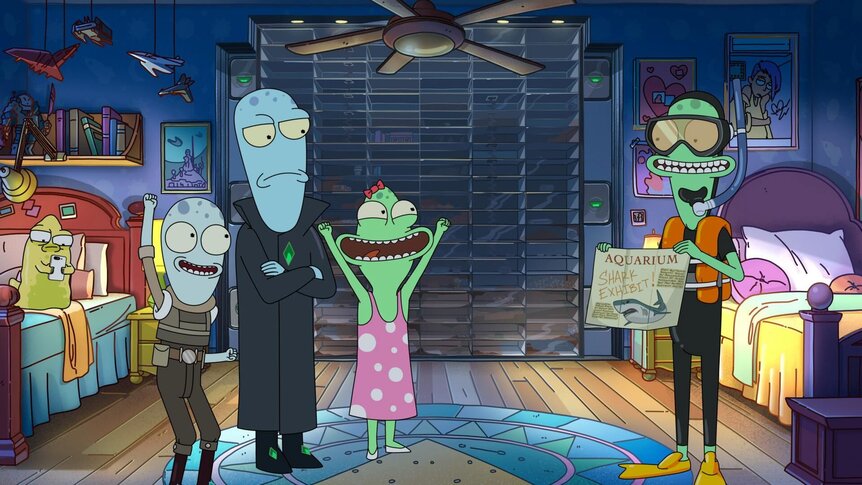Create a free profile to get unlimited access to exclusive videos, sweepstakes, and more!
The anti-ALF: Solar Opposites creators dissect their trope-defying alien show
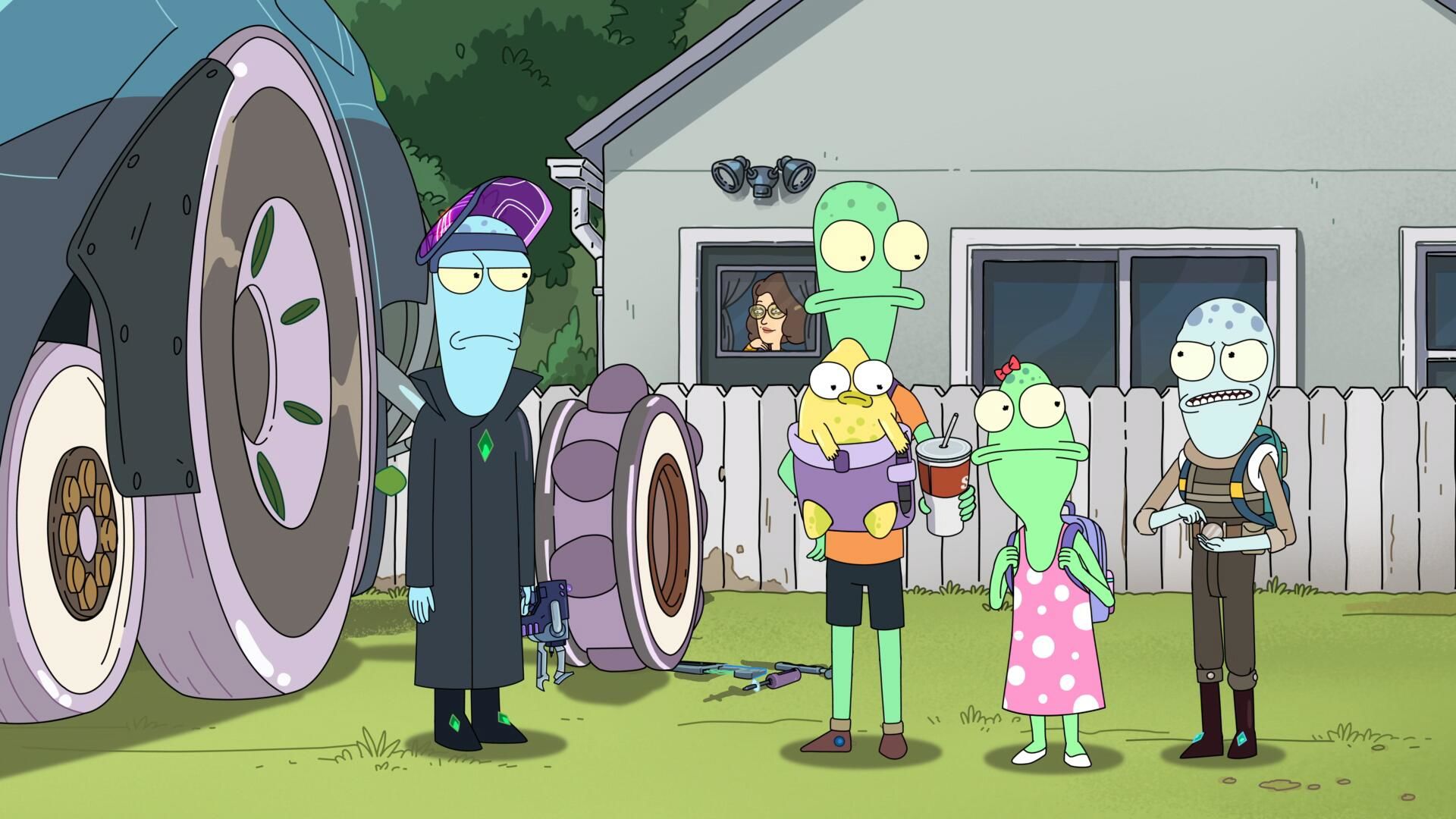
The hackneyed concept of aliens living on Earth has been done to death, but in the hands of two Rick and Morty creatives, the premise transforms into something you'd never expect it to be.
Created by Justin Roiland and Mike McMahan, Solar Opposites (invading Hulu today) centers on a group of dysfunctional refugees from the planet Shlorp. Their homeworld blew up, à la Krypton, and now they're aiming for a fresh start on ours — at least until their pet Pupa fulfills its destiny by growing to a cyclopean size, eating everything in existence, and terraforming the planet to Shlorpian specifications.
Over a series of chats with SYFY WIRE leading up to the show’s release, the creators gave us the lowdown on their madcap E.T. undertaking.
"I love sci-fi, so we wanted something that looked like it could fit next to Family Guy or The Simpsons on a billboard, but then when you got closer to it, it got weirder and weirder," McMahan, a Rick and Morty writer/producer who is also behind Star Trek: Lower Decks, told SYFY WIRE when we spoke with him in April.
"I was imagining [it] as a live-action thing with weird papier-mâché heads and CGI eyes and mouths," Roiland, who first thought of the idea around 2006, told us when we later caught up with him by phone. "They had some sort of supreme leader that they checked in with at the beginning and end. And they had ... some mission on Earth, and they were very at odds with their feelings [about] Earth. One of them loved Earth: pop culture, video games, everything. And the other one hated Earth and humans and pollution, and just saw everything in a negative light."
Between Seasons 2 and 3 of Rick and Morty, Roiland (famous for voicing the titular characters on that show, which he co-created with Dan Harmon) revisited the idea, bringing McMahan aboard and fleshing out the odd-couple dynamic between pessimistic Korvo (Roiland) and happy-go-lucky Terry (Silicon Valley's Thomas Middleditch). The alien duo eventually blossomed into a family unit composed of the slug-like/mostly non-verbal Pupa and two teenage "replicants": optimistic Jesse (Golan the Insatiable's Mary Mack) and mean-spirited Yumyulack (The Goldbergs' Sean Giambrone).
With his long overcoat and characteristic pout, Korvo is the only member of the group who takes the mission seriously. He just wants to fix their busted spaceship (lodged in the roof of their suburban house), but that task always falls to the wayside when he's roped into Terry's crazy schemes.
"He only sees the bad in the world," McMahan said. "When you feel like you’re not in control, you’re just looking for things to be critical about, and that’s Korvo. But deep inside all of that, [he] secretly wants all the stuff anybody would want. He wants to be liked, he wants to be included, he wants to be respected. And so it’s weird to be critical of everything but then want the people that you’re being critical of to like you."
"He’s an annoyed, put-upon [guy]," Roiland continued. "He doesn’t wanna have fun, but begrudgingly kinda does and then eventually can flip into actually full-blown having fun. But it’s always a process to get him there. He’s got his arms folded and he just doesn’t wanna participate and 'everything’s stupid' and 'humans are dumb.' It’s an interesting headspace to be in, and you can have a lot of fun improv when you’re in that headspace. And having Thomas Middleditch as Terry, it’s the f***in’ perfect combo."
Despite having access to miraculous alien technologies, the characters' problems (wanting to be accepted by the other kids at school, trying to buy a jet ski, running for president of the homeowners' association) are still surprisingly human. As a result, most of the show's comedy is derived from the ways in which the aliens try to overcorrect these everyday issues with otherworldly solutions that cause things to spiral out of control. But hey, they don't know any better.
"They are fish out of water. They are kind of an ‘other,’ an immigrant story. People that don’t feel like they fit in," McMahan said. "It’s just an interesting storytelling area to be [in]. ... For these aliens, a garbage truck might roll up and they’re like, ‘What the f*** is that, and why is it taking our precious garbage?’ It’s almost like a child-like sort of storytelling, but at the same time getting to expand it and find a lot of comedy with it."
"They’re smart in their own way, but they’re kind of not street-smart. They’re certainly not smart when it comes to human culture and human morality — all that stuff," Roiland explained. "They’re soaking up pop culture and movies and video games, and that’s the biggest foundation of their understanding of human culture."
What really appealed to the creators, though, was the chance to tell an aliens-on-Earth story without drawing attention to the presence of extraterrestrials in suburbia. In the show, the fact that life beyond our solar system really exists is just another accepted part of reality.
"We grew up watching shows where aliens were hiding from the government and hiding from cops and pretending to fit in. And we wanted to do an alien show that’s [different]," McMahan continued. "We love those shows — we grew up watching ALF and 3rd Rock From the Sun and all these things — and we were like, ‘You know what? There’s a way to do these shows where you never have to cover that again.’ I never want to have Korvo be worried that the FBI is gonna knock his door down unless he’s cooking meth."
Roiland compared it to living in Los Angeles, where a person gets used to seeing celebrities walking around all the time.
"It’s sort of like, ‘Oh look, there’s The Rock. Okay, anyways, what were we doing?’ I was like, ‘That’s sort of the way I want humans to treat the aliens.’ If they hate the aliens or if they’re mad at the aliens, it’s because [the aliens] did something to f*** with them," he said.
This narrative choice was also an extension of something the creators learned on Rick and Morty, which is currently airing its fourth season on Adult Swim. Rather than wasting precious time by acknowledging that certain events should be unbelievable, you can simply ignore it, thus upping the comedy and surrealism.
"If Morty comes in through a portal in the cafeteria, we’re not gonna spend any time having characters be like, ‘What the f***?' ... It’s just, 'Whatever, move on, who cares? It’s fine,'" Roiland added with a laugh.
"You can have sci-fi stuff, but not have to explain it the whole episode," McMahan said. "Just let it be what it is and let the characters live in it and the audience is smart enough and savvy enough to stick along with it. We live in a time where a lot of sci-fi movies and TV shows are so mythological at this point that you don’t have to explain nanobots anymore. You don’t have to explain these big sci-fi concepts. You get to treat them as if everybody knows about them."
And while Solar Opposites might look like Rick and Morty (after all, it does adopt Roiland's unique art style and is animated by the same studio), it's not the same show. If anything, it's a glass-half-full reflection of its slightly more fatalistic cousin on Adult Swim.
"The show has this gentler, lighter feel to it than Rick and Morty," Roiland said. "Because Rick and Morty has the crazy existentialism and there’s a thread of sadness, I think, underpinning everything, because Rick is ultimately a very sick and flawed individual, despite all the craziness and fun and comedy."
The decision to go for a "lighter" vibe was a sentiment championed by McMahan, whom Harmon would jokingly refer to as "a ray of sunshine" in the Rick and Morty writers' room. As a self-proclaimed "optimistic dude," McMahan was able to infuse his new series (and the character of Terry in particular) with an idealism that wouldn't need to answer to a higher authority.
"On Rick and Morty, all my writing was to make sure that [Dan] was happy and that Justin was happy," he admitted. "And on Solar, it’s just to make sure I’m happy and I have a very different set of things that TV gives me that makes me happy, and that’s what Solar’s all about."
"We can still do all the crazy sci-fi stuff and perceive it through the eyes of these more innocent, non-malicious characters that don’t know every step of the chess game before it’s been played," Roiland added. "Rick knows, a lot of times, all the moves before anyone’s even said go, and that’s a really interesting place to go from with writing a story [and] breaking a story. There’s a lot of cool stuff we get to do knowing that, but with these characters, that’s not the case. They’re not savvy, so I think it’s a bit more relatable."
All eight episodes of Solar Opposites Season 1 are now streaming on Hulu. A second season is already in the works.
